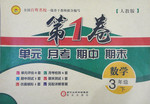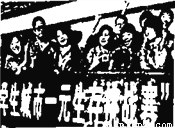
�����ģ�You'd better not eat too much fast food, such as potato chips and hamburgers, if you don't want to put on _______.
A. wealth B. weight
C. power D. fame
B �������� ���⣺����㲻���������أ�����ò�Ҫ��̫����ʳƷ��������Ƭ�ͺ���������С�⿼�����ʴ��������A. wealth��Ϊ���Ƹ����� B. weight��Ϊ���������� C. power��Ϊ��Ȩ������ D. fame��Ϊ��������������ò�Ҫ��̫��Ŀ��ʳƷ��ԭ�������ǻ�ʹ��ġ����ء����ӣ���ѡB�� ��1����Ԫ�¿�������ĩϵ�д�
��1����Ԫ�¿�������ĩϵ�д�
| �꼶 | ���пγ� | �꼶 | ���пγ� |
| ��һ | ��һ��ѿγ��Ƽ��� | ��һ | ��һ��ѿγ��Ƽ��� |
| �߶� | �߶���ѿγ��Ƽ��� | ���� | ������ѿγ��Ƽ��� |
| ���� | ������ѿγ��Ƽ��� | ���� | ������ѿγ��Ƽ��� |
��Ŀ������Ӣ�� ��Դ��ɽ��ʡ̩����2018���п�Ӣ���Ծ� ���ͣ��Ķ���ѡ
If you are given only 1yuan, could you live in a city for one day? It seems this may be a little

difficult. But students from Xi'an did it.
On April 10, more than 60 students from a middle
school of Xi'an took port in the One Yuan Metropolis
Survival. Students not only have to live, but also have to
deal with a lot of hard tasks in this charitable(���Ƶģ�
activity. It has happened in eight cities and is going to
four others, including Beijing, in May.
To make money, many students looked for part-time
jobs and experience how hard life was. Zhang Qiyue,14, asked more than 10 restaurants for a job
and finally got one chance. "We were upset when they said no. But gradually, we got used to it."
he said. After being a waiter for an hour, he got 25 yuan.
Some made use of their talents by singing and dancing in parks or shopping malls. Many
people who walked by took notice and helped them. Zhao Jiacheng,14, drew pictures and made
paper crafts (�ֹ�). "This showed it��s important to learn a special skill,�� he said.
Living was hard, but finishing the tasks wasn't any easier. They went to different places to
finish tasks in a short time. The most amazing one was when they had to exchange things worth
thousands of yuan with only a piece of paper in half an hour. "We learned how to explain to others. From a balloon to a cake to a bottle of yogurt... after almost 20 tries, we succeed,�� he said. They
will give all the money they made to poor schools in Tibet.
1.The students should in this activity.
A. be given enough money B. complete some easy tasks
C. live and finish difficult tasks D. give away their pocket money (����Ǯ��
2.To make money, students tried many things EXCEPT .
A. going to Beijing for work B. doing part-time jobs
C. giving talent shows D. drawing and making paper crafts
3.What did the students leant from (his activity?
a. Living was hard.
b. It was much easier to finish the tasks than living.
c. It was important to learn a special skill.
d. Success came from many tries.
A. abc B. abd C. bcd D. acd
4.What's the main purpose of this activity?
A. To let studens from different cities communicate with each other.
B. To teach students how to make money.
C. To develop students�� living skills and social responsibility.
D. To make students realize the importance of learning a special skill.
1.C 2.A 3.D 4.C ������������һƪ���ű�����������һЩѧ����һԪǮ�ڳ���������һ�죬����ͨ���Լ���Ŭ�������ָ�������������Ǯ����������ᵽ����IJ���ѧϰ���ܵ���Ҫ�ԡ� 1.����Students not only have to live, but also have to deal with a lot of hard tasks in this ch...�鿴�𰸺ͽ���>>
��Ŀ������Ӣ�� ��Դ������ʡ������2018���п�Ӣ���Ծ� ���ͣ���ѡ��
-- Hello, Sally! Can I see Mr. Brown?
-- _________. I'll tell him you are here.
A. What a pity
B. Just a minute
C. Congratulations
D. Never mind
B �����������⣺������ã�ɯ���ҿ��Լ����������𣿡����Ե�һ�ᣬ�ҽ������������ˡ����⿼���龰���ʡ�A. What a pity���ź���B. Just a minute�Ե�һ�C. Congratulationsף�أ�D. Never mindû��ϵ���������ġ���ã�ɯ���ҿ��Լ����������𣿡��ͺ����I'll tell him you are here. ���ҽ������������ˡ���������...�鿴�𰸺ͽ���>>
��Ŀ������Ӣ�� ��Դ���˽̰���꼶�²�Ӣ�� unit11 ��6��ʱ ���� ���ͣ���ѡ��
Ms. Green checked everything carefully before she left the hotel, making sure that nothing was _______.
A. laid out B. left out
C. blown out D. given out
B �������� ���⣺����Ůʿ���뿪�ù�֮ǰ��ϸ�����һ�У�ȷ��û�������κζ�������С�⿼����ﶯ�ʱ�����A. laid out ��lay out��ȥ�ִʣ���Ϊ���ڿ������á��� B. left out ��leave out��ȥ�ִʣ���Ϊ�����ԣ���©���� C. blown out�� blow out�Ĺ�ȥ�ִʣ���Ϊ�����𡱣� D. given out ��give out��ȥ�ִʣ���Ϊ���ַ�...�鿴�𰸺ͽ���>>
��Ŀ������Ӣ�� ��Դ���˽̰���꼶�²�Ӣ�� unit11 ��6��ʱ ���� ���ͣ���ѡ��
�����ģ�Julie _______ to show her agreement. Then we went to the park together.
A. added B. bowed
C. knocked D. nodded
D �������� ���⣺�����ͷ��ʾͬ�⡣Ȼ������һ��ȥ������С�⿼�鶯�ʴ��������A. add��Ϊ�����ӡ��� B. bow��Ϊ���Ϲ����� C. knock��Ϊ���ã������� D. nod��Ϊ����ͷ�������ݡ�����һ��ȥ�˹�����֪������ͷ����ʾͬ��ȥ����ѡD���鿴�𰸺ͽ���>>
��Ŀ������Ӣ�� ��Դ���˽̰�2018����꼶ȫһ�� Unit4 ��Ԫ���Ӣ���Ծ� ���ͣ��Ķ���ѡ
Tuesday, 1stSeptember
I had mixed feelings today, nervous, worried, happy, excited�� My heart went down when Miss Chan, our head teacher, said that Matthew and Beth, two students from England, would spend three months with us! I was worried that I had to speak English so much! But at the end of the school day, I was happier than I thought: the morning with them today was more enjoyable than I expected.
Today is the most unforgettable first day I have had! Matthew is fantastic! His English is clearer and easier to listen to than I thought. The other English student, Beth, is the most helpful girl I��ve ever met. There were lots of things to do on the first day. Beth offered to help Miss Chan put up all the notices. Of course, some of the credit (����) should also go to ME because I translated some of the notices for her. Miss Chan praised us!
We finished all the preparations 10 minutes earlier than expected, then Beth and I talked for a while, Matthew sang several English songs and did some stand-up comedy (����ϲ�����) at the party. We all praised him. When the bell rang to end the first school day, none of us wanted to leave.
When I went back home, I had a little headache. I have probably spoken more English today than the whole of last year.
It was really a happy day! I hope our friendship can continue, even after they gone back to England!
1.The writer felt ______ when he heard the news from Miss Chan.
A. excited B. angry
C. fantastic D. worried
2.Beth helped Miss Chan with the ______.
A. comedy B. speeches
C. notices D. translation
3.Matthew ______ at the party.
A. had a talk
B. rang the bell
C. sang several songs
D. made a preparation
4.Matthew and Beth ______ on the first day.
A. spoke much Chinese B. got lots of praise
C. had a little headache D. forgot to leave the school
5.From the passage, we know that the writer ______.
A. caught a bad cold that day
B. went back home with Beth
C. expects to travel to England
D. likes the two English students
1.D 2.C 3.C 4.B 5.D �������� ������ƪ������Ҫ�������ߵİ���Ҫ���������ѧ����һ��ʼ���߸е��ܵ��ģ������Լ����������ǵĻ������Ǻ�������ѧ���ദ��һ��֮�����ߴӿ�ʼ�ĵ��ı�ÿ��ģ��������ǽ��������꣬ 1. 2. 3. 4. 5.�鿴�𰸺ͽ���>>
��Ŀ������Ӣ�� ��Դ���˽̰�2018����꼶ȫһ�� Unit4 ��Ԫ���Ӣ���Ծ� ���ͣ���ѡ��
�����ģ�Some people think that England and Scotland a better understanding of each other.They belong to one family.
A. require B. review C. receive
A �������� ���⣺��Щ����ΪӢ�������ո���Ҫ��˴��и��õ����⡣��������һ����ͥ��require��Ҫ;review��ϰ;receive�յ�����ϱ����ᄈ��֪,һЩ�˾���Ӣ�������ո�������Ҫ�����õ�����Է�,��������ͬһ�����塣�ʴ�ΪA���鿴�𰸺ͽ���>>
��Ŀ������Ӣ�� ��Դ���˽̰�2018����꼶ȫһ�� Unit5 ��Ԫ����Ծ� ���ͣ���ѡ��
When Robinson Crusoe got to the island,the first thing he did was to look for some food.
A. who B. that C. which D. whom
B �������� ����:��³��ѷ����³�����ﵺ��ʱ,�����ĵ�һ���¾���Ѱ��һЩʳ����д�thingָ����ұ�������first����,����that��������Ӿ䡣��ѡB���鿴�𰸺ͽ���>>
��Ŀ������Ӣ�� ��Դ���Ĵ��˱�2018���п��Ծ� ���ͣ��Ķ���ѡ
China��s national anthem, March of the Volunteers, is a song that we learn at the beginning of primary school and sing at every flag-raising ceremony. And now, there��s even a law to protect it.
Last September, the government passed the National Anthem Law, which became effective(��Ч)
from Oct.1, 2017. It states how we should sing or play the song, requiring all of us to behave towards it politely.
Primary and middle schools must teach the anthem to their students and make them understand the song��s spirit and history. Moreover, the law requires us to be serious when we are singing the song. We can��t joke about it or change the song��s words or music. If someone breaks the law, he or she can be detained for up to 15 days, or face further punishment in more serious situations. The national anthem is different from other songs �C it is the symbol of our country.
Many foreign countries also have laws for their national anthems. For example, American school children should put their right hand over their heart while singing their country��s anthem at school. In Russia, the national anthem must be played on television and radio before the start and end of broadcasting. And in the Philippines, people are required to sing the national anthem with feelings when it��s played in public.
1.How long has the National Anthem Law become effective till now?
A. For more than one year. B. For just half a year.
C. For less than 9 months. D. For about 10 months.
2.Why must we be serious when singing the song?
A. Because the school asks us to. B. Because it has a long history.
C. Because we are good students. D. Because it��s our country��s symbol.
3.What does the underlined word ��detained�� mean?
A. Kept in a police station. B. Forced to work.
C. Prevented from eating. D. Kept singing the song.
4.Students are required to put their right hand over their heart in .
A. China B. America C. Philippine D. Russia
1.C 2.D 3.A 4.B �����������½������й��ƶ��˹��跨�� 1.����which became effective(��Ч)from Oct.1, 2017.��֪��2017��10��1����Ч������9���£���ѡC 2.����the law requires us to be serious when we are singing the song.��it is ...�鿴�𰸺ͽ���>>
����ʡ������Υ���Ͳ�����Ϣ�ٱ�ƽ̨ | �����к���Ϣ�ٱ�ר�� | ����թƭ�ٱ�ר�� | ����ʷ���������к���Ϣ�ٱ�ר�� | ������Ȩ�ٱ�ר��
Υ���Ͳ�����Ϣ�ٱ��绰��027-86699610 �ٱ����䣺58377363@163.com